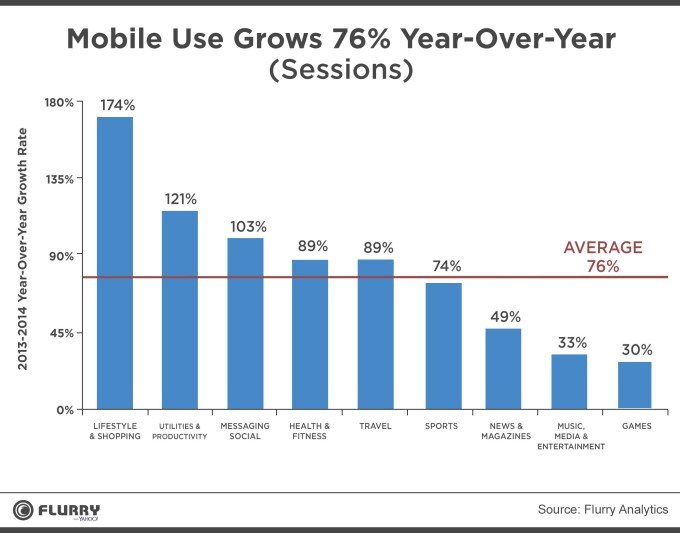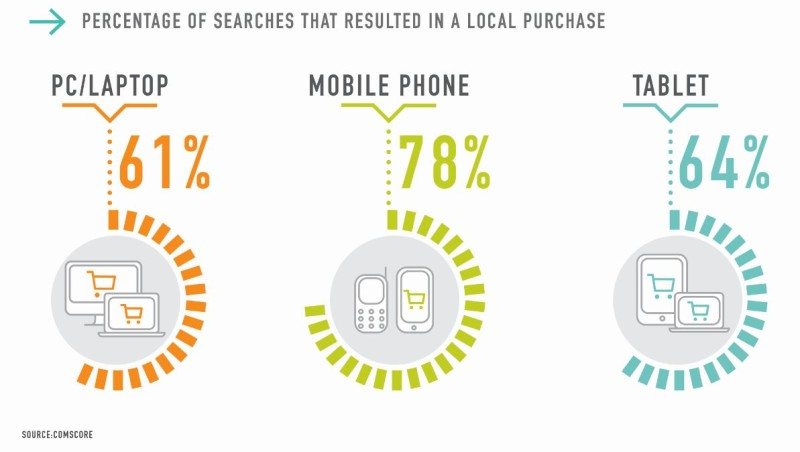Not only has the number of mobile-only internet users overtaken desktop-only, but app usage has also surpassed desktop usage. For retailers, that’s not the only thing of interest. Statistics show that multi-platform use in retail continues to grow significantly more than in other verticals.
Source: Amazon
With “Mobilegeddon” eliminating all doubts about the importance of mobile, all retailers – not just the big players – are now re-thinking their mobile strategies. The major question that retailers have been grappling with is whether a mobile website or a mobile app is the right way to go.
This post is going to outline the benefits of both, showing that it’s not a matter of having one or the other, but rather making sure you build a robust mobile presence that better engages a platform agnostic, highly active mobile customer base.
Mobile App Pros
Mobile apps are effectively transforming retail, maybe more so than any other industry. Two years ago, shopping apps increased by 174% – the highest of any app category and by 2020, mobile commerce will make up 45% of total e-commerce, equaling $284 billion in sales. Furthermore, Cisco’s 5th Annual Retail Survey found that 55% of shoppers will use a retailer’s app either for or while shopping. Clearly, the market for retail mobile apps is thriving, and apps offer a number of benefits that other channels can’t.
Richer Customer Experience
If there’s a single truth to shopping, it’s that the customer experience matters. The Cisco survey mentioned above reinforces this, suggesting that context and hyper-relevance is a key way to win over digital consumers. A mobile app is the ultimate way to improve the customer experience, acting as an extension of a retailer’s brand and offering features that aren’t possible anywhere else. Here are just a few of the possibilities:
- in-store engagement and special offers via push notifications
- customized shopping experiences using beacon technology
- mobile payments from customer devices
Loyalty Integration
Mobile apps can facilitate both mobile payments and rewards programs on a single channel. Loyalty programs can work on a much deeper, more personalized level, offering discounts not only based on past purchasing patterns, but also customer geography, location within stores, interests, and more.
Deeper Analytics
In retail, insight is the new currency, and context is king. Delivering the personalized, hyper-relevant experiences that customers demand requires a deep understanding of the customers themselves, which requires data. Mobile apps offer unparalleled analytics capabilities, which allow retailers to better understand their customers and make data-driven business decisions that will improve the shopping experience and drive sales, both in-store and out-of-store.
The other major advantage of mobile apps is that you are given real estate on your customers’ devices, which are increasingly being carried everywhere at all times by shoppers. Retailers are able to have their stores right on their customers’ smartphones and tablets. This presents a huge opportunity for hyper-targeted marketing and a level of customer engagement that can’t be matched on any other channel.
Mobile Web Pros
Shopping on mobile continues to grow tremendously. Mobile now accounts for over half of all e-commerce traffic, and a staggering 78% of mobile searches for local businesses and services result in a purchase.
Given the high volume of activity, having a website that is optimized for mobile is a no-brainer. Other advantages to mobile websites include:
Better Customer Experience
E-commerce shoppers expect a multi-device, multi-channel experience to be available to them, and mobile is now driving more activity than desktop. Retailers that don’t have a mobile website are failing to cater to over 50% of the e-commerce market.
Bigger Customer Base
While in-app activity is increasing, the majority of shoppers still prefer mobile web. Shoppers that don’t have loyalty to your brand are still a huge market – making the path to purchase as easy as possible will allow retailers to reach a broader customer base that isn’t necessarily interested in loyalty programs or consistent purchasing from any one brand.
Cost-Effective
Responsive websites now handle all screen sizes from a single build, so users can visit, search and shop from all types of devices without the need for multiple websites.
SEO & Brand Visibility
Mobilegeddon confirmed long-held speculation that mobile-friendliness was a ranking signal. Mobile optimized sites are now ranked higher in search engine results pages than sites that are not optimized for mobile. Retailers with mobile-friendly sites are more likely to rank better, meaning greater brand visibility, higher website traffic, and consequently more sales.
Building a Mobile Presence
In the end, retailers should consider developing both a mobile website and a mobile app. The market is there for both, and your customer base will be using both. While the majority of your customers will search, visit and shop using mobile web, your core customer base who repeatedly purchase are demanding loyalty integration, richer shopping experiences and new ways to engage with your brand. They’re offering real estate on their phones – are you going to take it?









